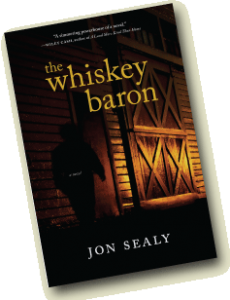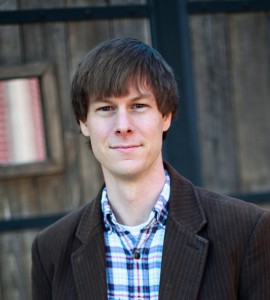 I've been lucky enough to get to know Jon Sealy recently, right as he is poised to have many people get to know him, too. His first novel, The Whiskey Baron, comes out from Hub City Press on April 1. In chatting with Jon in Richmond and at The Virginia Festival of the Book, he casually mentions basically every great book I've ever read or wanted to read. The guy is serious about literature. See below: his goal of reading one hundred pages a day and writing one thousand words is not only more prescriptive than many writers I know, but also more sincere. He means to become a better writer. I don't know of a higher goal. And, although I haven't yet read The Whiskey Baron, I gather from the stellar reviews that he's already an excellent one.
Wiley Cash called The Whiskey Baron, “a simmering powerhouse of a novel.” Ron Rash said it evokes “the pleasures of both mystery novel and literary fiction.” And Donald Ray Pollack called it a “gritty, superbly crafted novel.” I can't wait to read it and am glad that Jon Sealy was willing to answer a few basic questions about his writing process and publishing success:
I've been lucky enough to get to know Jon Sealy recently, right as he is poised to have many people get to know him, too. His first novel, The Whiskey Baron, comes out from Hub City Press on April 1. In chatting with Jon in Richmond and at The Virginia Festival of the Book, he casually mentions basically every great book I've ever read or wanted to read. The guy is serious about literature. See below: his goal of reading one hundred pages a day and writing one thousand words is not only more prescriptive than many writers I know, but also more sincere. He means to become a better writer. I don't know of a higher goal. And, although I haven't yet read The Whiskey Baron, I gather from the stellar reviews that he's already an excellent one.
Wiley Cash called The Whiskey Baron, “a simmering powerhouse of a novel.” Ron Rash said it evokes “the pleasures of both mystery novel and literary fiction.” And Donald Ray Pollack called it a “gritty, superbly crafted novel.” I can't wait to read it and am glad that Jon Sealy was willing to answer a few basic questions about his writing process and publishing success:
VP: People are always curious about the origins of a novel and sometimes writers have to say that it just “came to them.” But, I’m especially curious in your case if you thought of this tale because of having lived in the area where it takes place? Did the setting nudge you to write a story there?
JS: Absolutely. This novel is set in a South Carolina mill town during the Depression, and the place and time were both critical for me. As you note, I did grow up in South Carolina, and some of my family members came out of the cotton mills there. I know the area today well, but I was curious to know more about life back in my grandfather's childhood. I've never been sure whether to think of the book as "historical fiction," a term that for me evokes Medieval England or some other completely fabricated era. The 1930s are a complete fabrication for me, being born a half-century later, but the oldest among us actually experienced that era. I was able to talk with folks about life back then, and hear their speech patterns, that sort of thing. It wouldn't be possible for me to do that with a book set even a few years earlier, so I see the 1920s and 1930s as kind of a hinge, where experienced life fades into history.
VP: You have written short stories for some time and had a number published in good places. What led you to decide to write a novel instead of sticking with a form you obvious know so well? Do any of your earlier short stories cover a similar territory as The Whiskey Baron?
 JS:
JS: I actually don't think I know the short story form that well. I wrote stories in graduate school for a number of reasons. For one thing, it's easier to workshop a story than a chapter of a novel. For another, there's a a kind of cult of the short story among graduate students that I suppose I got swept into. Don't get me wrong; I love reading a good short story. But the novel is the form I live for.
VP: Hub City seems like the perfect press for your novel since it is located in the South, near the mountains. How did you come to find them or vice versa? Was yours a long path to publication or a straight shot?
JS: Hub City is a dream. The organization is a boutique press that focuses primarily on regional literature, but they also have a great bookstore in Spartanburg, South Carolina. Perhaps because they have a bookshop, they know books well and they know the business, and I really feel at home with them.
They've been on my radar for years. They published Ron Rash's first book of poetry,
Eureka Mill, in the late 1990s, and they also published an anthology of short fiction,
New Southern Harmonies, that included a few stories from George Singleton. I stumbled onto Rash and Singleton when I was about 19 and looked up everything they'd written at that point, which led me to Hub City.
Fast-forward ten years, and I had a novel that was going nowhere with the agents. A former professor suggested Hub City might be the ticket, and here we are. I suppose every debut novelist has a tale of woe about breaking through, but it's all the same story: work, work, work, rejection, rejection, work, work, work, rejection, rejection, and eventually you get a lucky break.
VP: Betsy Teter, who runs Hub City and is a wonderful person and visionary, came up with the terrific idea of helping first time authors launch their careers. Her press only published first novels. That’s just great as a writer is poised for their debut, but then comes the question: what’s next? Do you have another book up your sleeve and any thoughts about the path it might take?
JS: It's true. Hub City does a great job with first novels. Every other year, they run a contest for first-time novelists in South Carolina, and in the off years they publish work from the broader region. By sticking with one novel a year, I think they're able to really give it a go and set the novelist up for a successful career. My job, then, is the what-next. I do have another finished novel, which is with my agent. I think he'll be shopping it around soon, which means my job is actually the what-next-next. It never ends!
VP: And finally, any tidbits of advice for aspiring writers? This is your chance to share your do’s and don’ts.
JS: The business of a novelist is to read a lot and write a lot. Period. I've heard some rules of thumb—like, it will take you about a thousand pages before you get your first short story published—but they all come down to getting the work done. If you set yourself a goal to read a hundred pages every day and write a thousand words every day, five or more days a week, and you make an honest effort to accomplish that goal over ten years, you will probably have a book ready for publication. Everything else is just noise.
 I've been lucky enough to get to know Jon Sealy recently, right as he is poised to have many people get to know him, too. His first novel, The Whiskey Baron, comes out from Hub City Press on April 1. In chatting with Jon in Richmond and at The Virginia Festival of the Book, he casually mentions basically every great book I've ever read or wanted to read. The guy is serious about literature. See below: his goal of reading one hundred pages a day and writing one thousand words is not only more prescriptive than many writers I know, but also more sincere. He means to become a better writer. I don't know of a higher goal. And, although I haven't yet read The Whiskey Baron, I gather from the stellar reviews that he's already an excellent one.
Wiley Cash called The Whiskey Baron, “a simmering powerhouse of a novel.” Ron Rash said it evokes “the pleasures of both mystery novel and literary fiction.” And Donald Ray Pollack called it a “gritty, superbly crafted novel.” I can't wait to read it and am glad that Jon Sealy was willing to answer a few basic questions about his writing process and publishing success:
I've been lucky enough to get to know Jon Sealy recently, right as he is poised to have many people get to know him, too. His first novel, The Whiskey Baron, comes out from Hub City Press on April 1. In chatting with Jon in Richmond and at The Virginia Festival of the Book, he casually mentions basically every great book I've ever read or wanted to read. The guy is serious about literature. See below: his goal of reading one hundred pages a day and writing one thousand words is not only more prescriptive than many writers I know, but also more sincere. He means to become a better writer. I don't know of a higher goal. And, although I haven't yet read The Whiskey Baron, I gather from the stellar reviews that he's already an excellent one.
Wiley Cash called The Whiskey Baron, “a simmering powerhouse of a novel.” Ron Rash said it evokes “the pleasures of both mystery novel and literary fiction.” And Donald Ray Pollack called it a “gritty, superbly crafted novel.” I can't wait to read it and am glad that Jon Sealy was willing to answer a few basic questions about his writing process and publishing success: JS: I actually don't think I know the short story form that well. I wrote stories in graduate school for a number of reasons. For one thing, it's easier to workshop a story than a chapter of a novel. For another, there's a a kind of cult of the short story among graduate students that I suppose I got swept into. Don't get me wrong; I love reading a good short story. But the novel is the form I live for.
JS: I actually don't think I know the short story form that well. I wrote stories in graduate school for a number of reasons. For one thing, it's easier to workshop a story than a chapter of a novel. For another, there's a a kind of cult of the short story among graduate students that I suppose I got swept into. Don't get me wrong; I love reading a good short story. But the novel is the form I live for.